Organisational Behaviour Analysis: Culture, Power, Motivation & Teams
VerifiedAdded on 2023/06/17
|17
|5761
|185
Report
AI Summary
This report provides a comprehensive analysis of organisational behaviour, focusing on the impact of culture, politics, and power on individual and team performance within Tesco, a British multinational retailer. It examines various organisational cultures through Handy's model (Power, Role, Task, and Person culture) and recommends a role culture for stability and task distribution. The report also discusses the negative effects of organisational politics on employee attitude, stress levels, and productivity. Raven's model is used to understand power dynamics, suggesting reward power to motivate employees. Furthermore, the report delves into content and process theories of motivation, including Maslow's Hierarchy of Needs and Herzberg's Two-Factor Theory, highlighting their application in achieving organisational goals. It also addresses team development theories and philosophies, assessing their relevance in enhancing business execution and production. The report concludes by emphasising the importance of a healthy and supportive work environment for optimal performance.
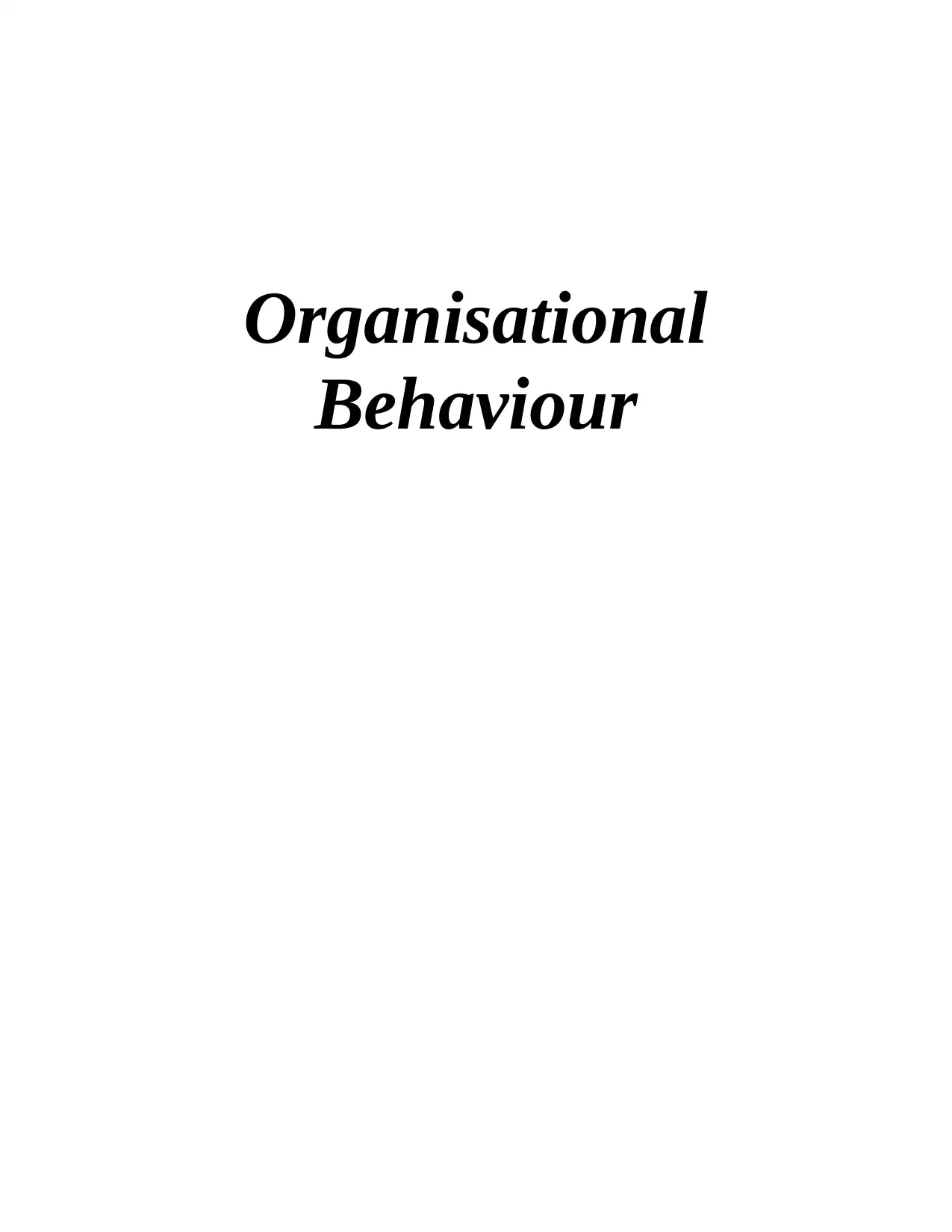
Organisational
Behaviour
Behaviour
Paraphrase This Document
Need a fresh take? Get an instant paraphrase of this document with our AI Paraphraser
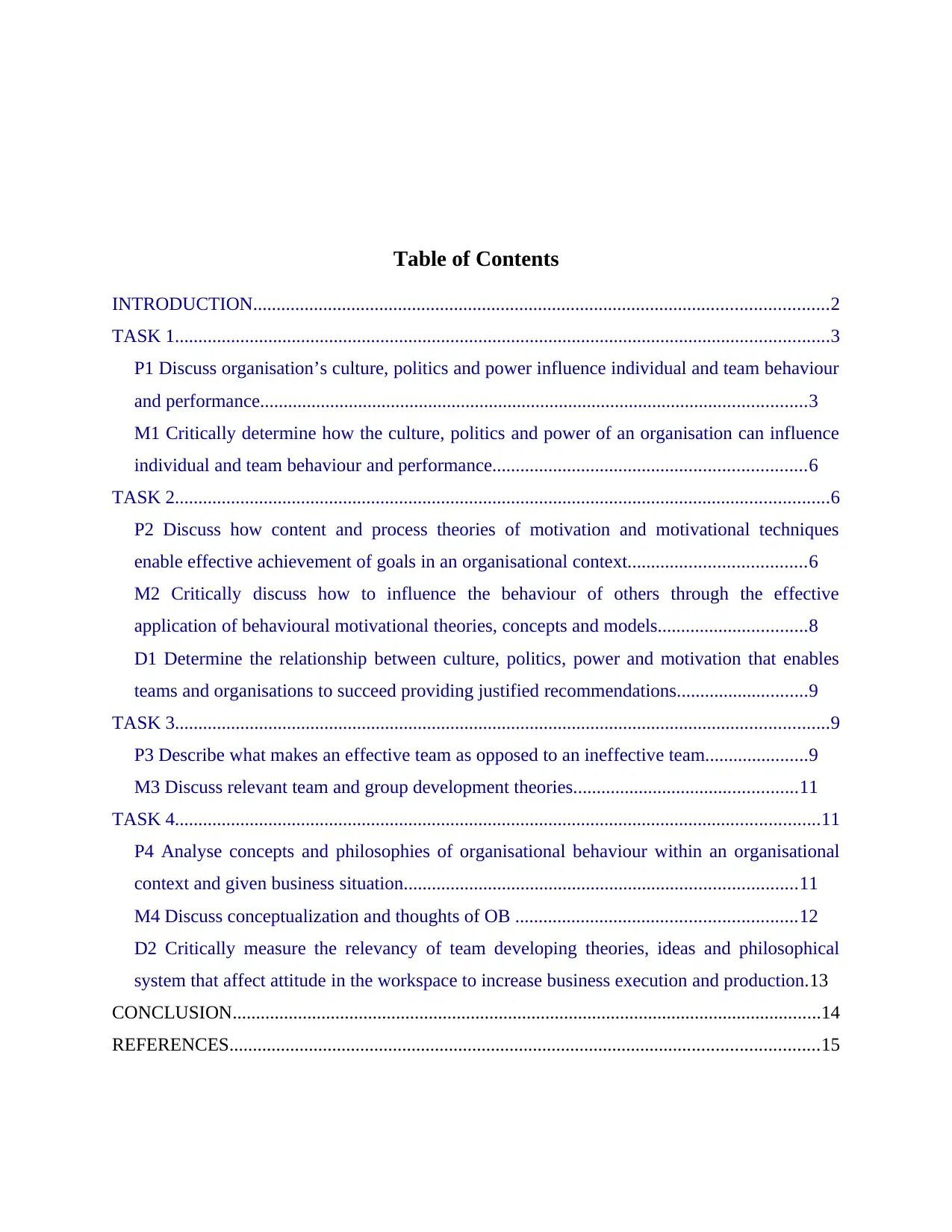
Table of Contents
INTRODUCTION...........................................................................................................................2
TASK 1............................................................................................................................................3
P1 Discuss organisation’s culture, politics and power influence individual and team behaviour
and performance.....................................................................................................................3
M1 Critically determine how the culture, politics and power of an organisation can influence
individual and team behaviour and performance...................................................................6
TASK 2............................................................................................................................................6
P2 Discuss how content and process theories of motivation and motivational techniques
enable effective achievement of goals in an organisational context......................................6
M2 Critically discuss how to influence the behaviour of others through the effective
application of behavioural motivational theories, concepts and models................................8
D1 Determine the relationship between culture, politics, power and motivation that enables
teams and organisations to succeed providing justified recommendations............................9
TASK 3............................................................................................................................................9
P3 Describe what makes an effective team as opposed to an ineffective team......................9
M3 Discuss relevant team and group development theories................................................11
TASK 4..........................................................................................................................................11
P4 Analyse concepts and philosophies of organisational behaviour within an organisational
context and given business situation....................................................................................11
M4 Discuss conceptualization and thoughts of OB ............................................................12
D2 Critically measure the relevancy of team developing theories, ideas and philosophical
system that affect attitude in the workspace to increase business execution and production.13
CONCLUSION..............................................................................................................................14
REFERENCES..............................................................................................................................15
INTRODUCTION...........................................................................................................................2
TASK 1............................................................................................................................................3
P1 Discuss organisation’s culture, politics and power influence individual and team behaviour
and performance.....................................................................................................................3
M1 Critically determine how the culture, politics and power of an organisation can influence
individual and team behaviour and performance...................................................................6
TASK 2............................................................................................................................................6
P2 Discuss how content and process theories of motivation and motivational techniques
enable effective achievement of goals in an organisational context......................................6
M2 Critically discuss how to influence the behaviour of others through the effective
application of behavioural motivational theories, concepts and models................................8
D1 Determine the relationship between culture, politics, power and motivation that enables
teams and organisations to succeed providing justified recommendations............................9
TASK 3............................................................................................................................................9
P3 Describe what makes an effective team as opposed to an ineffective team......................9
M3 Discuss relevant team and group development theories................................................11
TASK 4..........................................................................................................................................11
P4 Analyse concepts and philosophies of organisational behaviour within an organisational
context and given business situation....................................................................................11
M4 Discuss conceptualization and thoughts of OB ............................................................12
D2 Critically measure the relevancy of team developing theories, ideas and philosophical
system that affect attitude in the workspace to increase business execution and production.13
CONCLUSION..............................................................................................................................14
REFERENCES..............................................................................................................................15
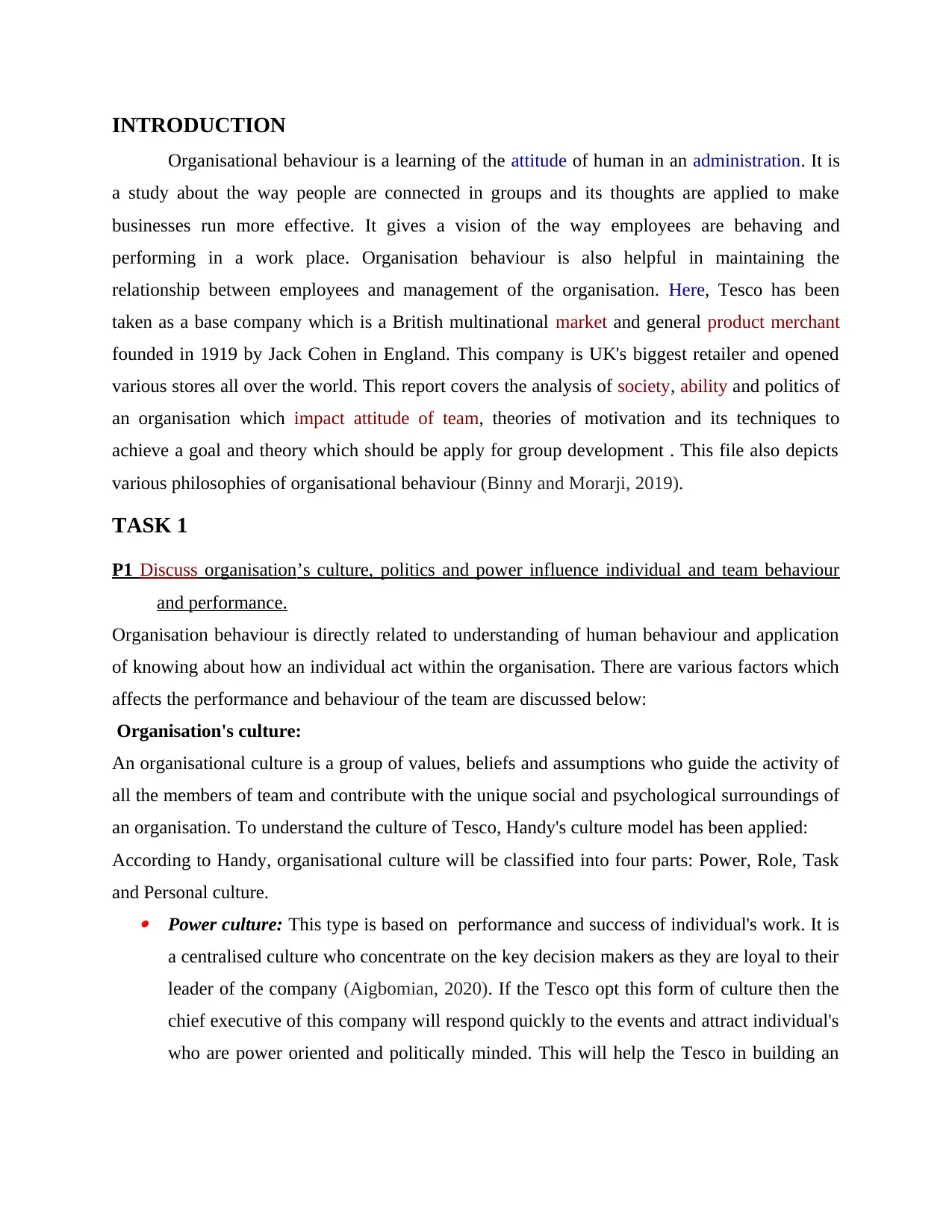
INTRODUCTION
Organisational behaviour is a learning of the attitude of human in an administration. It is
a study about the way people are connected in groups and its thoughts are applied to make
businesses run more effective. It gives a vision of the way employees are behaving and
performing in a work place. Organisation behaviour is also helpful in maintaining the
relationship between employees and management of the organisation. Here, Tesco has been
taken as a base company which is a British multinational market and general product merchant
founded in 1919 by Jack Cohen in England. This company is UK's biggest retailer and opened
various stores all over the world. This report covers the analysis of society, ability and politics of
an organisation which impact attitude of team, theories of motivation and its techniques to
achieve a goal and theory which should be apply for group development . This file also depicts
various philosophies of organisational behaviour (Binny and Morarji, 2019).
TASK 1
P1 Discuss organisation’s culture, politics and power influence individual and team behaviour
and performance.
Organisation behaviour is directly related to understanding of human behaviour and application
of knowing about how an individual act within the organisation. There are various factors which
affects the performance and behaviour of the team are discussed below:
Organisation's culture:
An organisational culture is a group of values, beliefs and assumptions who guide the activity of
all the members of team and contribute with the unique social and psychological surroundings of
an organisation. To understand the culture of Tesco, Handy's culture model has been applied:
According to Handy, organisational culture will be classified into four parts: Power, Role, Task
and Personal culture. Power culture: This type is based on performance and success of individual's work. It is
a centralised culture who concentrate on the key decision makers as they are loyal to their
leader of the company (Aigbomian, 2020). If the Tesco opt this form of culture then the
chief executive of this company will respond quickly to the events and attract individual's
who are power oriented and politically minded. This will help the Tesco in building an
Organisational behaviour is a learning of the attitude of human in an administration. It is
a study about the way people are connected in groups and its thoughts are applied to make
businesses run more effective. It gives a vision of the way employees are behaving and
performing in a work place. Organisation behaviour is also helpful in maintaining the
relationship between employees and management of the organisation. Here, Tesco has been
taken as a base company which is a British multinational market and general product merchant
founded in 1919 by Jack Cohen in England. This company is UK's biggest retailer and opened
various stores all over the world. This report covers the analysis of society, ability and politics of
an organisation which impact attitude of team, theories of motivation and its techniques to
achieve a goal and theory which should be apply for group development . This file also depicts
various philosophies of organisational behaviour (Binny and Morarji, 2019).
TASK 1
P1 Discuss organisation’s culture, politics and power influence individual and team behaviour
and performance.
Organisation behaviour is directly related to understanding of human behaviour and application
of knowing about how an individual act within the organisation. There are various factors which
affects the performance and behaviour of the team are discussed below:
Organisation's culture:
An organisational culture is a group of values, beliefs and assumptions who guide the activity of
all the members of team and contribute with the unique social and psychological surroundings of
an organisation. To understand the culture of Tesco, Handy's culture model has been applied:
According to Handy, organisational culture will be classified into four parts: Power, Role, Task
and Personal culture. Power culture: This type is based on performance and success of individual's work. It is
a centralised culture who concentrate on the key decision makers as they are loyal to their
leader of the company (Aigbomian, 2020). If the Tesco opt this form of culture then the
chief executive of this company will respond quickly to the events and attract individual's
who are power oriented and politically minded. This will help the Tesco in building an
⊘ This is a preview!⊘
Do you want full access?
Subscribe today to unlock all pages.

Trusted by 1+ million students worldwide
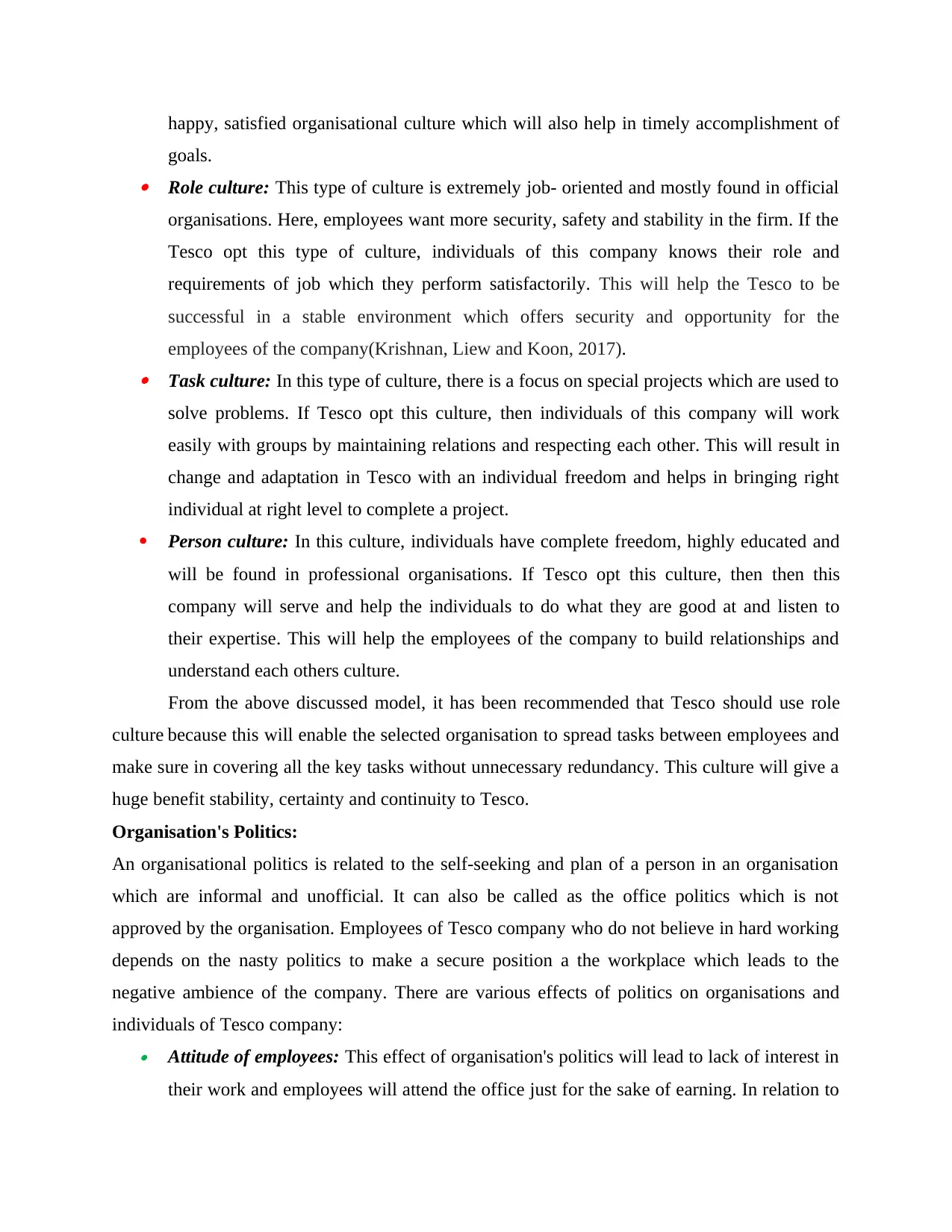
happy, satisfied organisational culture which will also help in timely accomplishment of
goals. Role culture: This type of culture is extremely job- oriented and mostly found in official
organisations. Here, employees want more security, safety and stability in the firm. If the
Tesco opt this type of culture, individuals of this company knows their role and
requirements of job which they perform satisfactorily. This will help the Tesco to be
successful in a stable environment which offers security and opportunity for the
employees of the company(Krishnan, Liew and Koon, 2017). Task culture: In this type of culture, there is a focus on special projects which are used to
solve problems. If Tesco opt this culture, then individuals of this company will work
easily with groups by maintaining relations and respecting each other. This will result in
change and adaptation in Tesco with an individual freedom and helps in bringing right
individual at right level to complete a project.
Person culture: In this culture, individuals have complete freedom, highly educated and
will be found in professional organisations. If Tesco opt this culture, then then this
company will serve and help the individuals to do what they are good at and listen to
their expertise. This will help the employees of the company to build relationships and
understand each others culture.
From the above discussed model, it has been recommended that Tesco should use role
culture because this will enable the selected organisation to spread tasks between employees and
make sure in covering all the key tasks without unnecessary redundancy. This culture will give a
huge benefit stability, certainty and continuity to Tesco.
Organisation's Politics:
An organisational politics is related to the self-seeking and plan of a person in an organisation
which are informal and unofficial. It can also be called as the office politics which is not
approved by the organisation. Employees of Tesco company who do not believe in hard working
depends on the nasty politics to make a secure position a the workplace which leads to the
negative ambience of the company. There are various effects of politics on organisations and
individuals of Tesco company: Attitude of employees: This effect of organisation's politics will lead to lack of interest in
their work and employees will attend the office just for the sake of earning. In relation to
goals. Role culture: This type of culture is extremely job- oriented and mostly found in official
organisations. Here, employees want more security, safety and stability in the firm. If the
Tesco opt this type of culture, individuals of this company knows their role and
requirements of job which they perform satisfactorily. This will help the Tesco to be
successful in a stable environment which offers security and opportunity for the
employees of the company(Krishnan, Liew and Koon, 2017). Task culture: In this type of culture, there is a focus on special projects which are used to
solve problems. If Tesco opt this culture, then individuals of this company will work
easily with groups by maintaining relations and respecting each other. This will result in
change and adaptation in Tesco with an individual freedom and helps in bringing right
individual at right level to complete a project.
Person culture: In this culture, individuals have complete freedom, highly educated and
will be found in professional organisations. If Tesco opt this culture, then then this
company will serve and help the individuals to do what they are good at and listen to
their expertise. This will help the employees of the company to build relationships and
understand each others culture.
From the above discussed model, it has been recommended that Tesco should use role
culture because this will enable the selected organisation to spread tasks between employees and
make sure in covering all the key tasks without unnecessary redundancy. This culture will give a
huge benefit stability, certainty and continuity to Tesco.
Organisation's Politics:
An organisational politics is related to the self-seeking and plan of a person in an organisation
which are informal and unofficial. It can also be called as the office politics which is not
approved by the organisation. Employees of Tesco company who do not believe in hard working
depends on the nasty politics to make a secure position a the workplace which leads to the
negative ambience of the company. There are various effects of politics on organisations and
individuals of Tesco company: Attitude of employees: This effect of organisation's politics will lead to lack of interest in
their work and employees will attend the office just for the sake of earning. In relation to
Paraphrase This Document
Need a fresh take? Get an instant paraphrase of this document with our AI Paraphraser
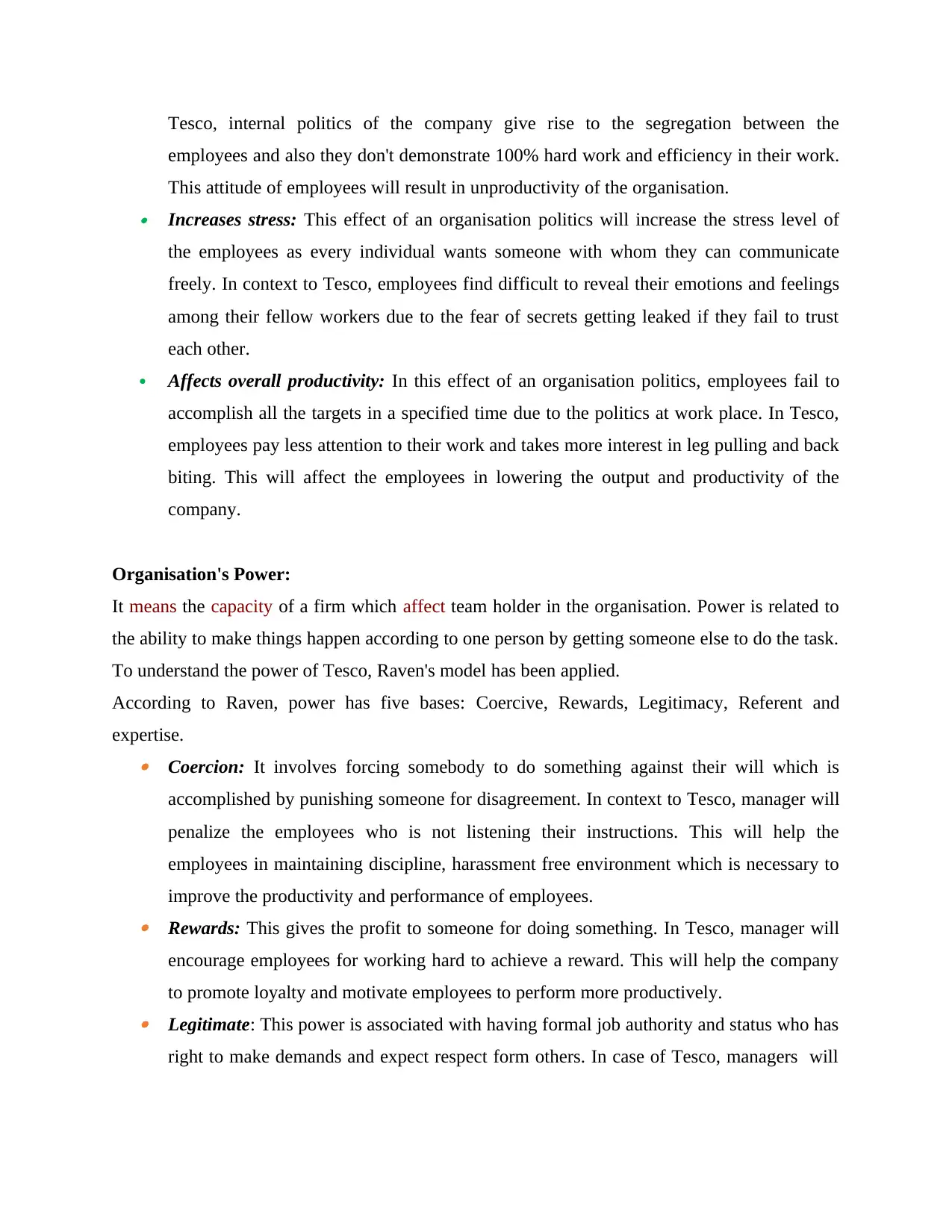
Tesco, internal politics of the company give rise to the segregation between the
employees and also they don't demonstrate 100% hard work and efficiency in their work.
This attitude of employees will result in unproductivity of the organisation. Increases stress: This effect of an organisation politics will increase the stress level of
the employees as every individual wants someone with whom they can communicate
freely. In context to Tesco, employees find difficult to reveal their emotions and feelings
among their fellow workers due to the fear of secrets getting leaked if they fail to trust
each other.
Affects overall productivity: In this effect of an organisation politics, employees fail to
accomplish all the targets in a specified time due to the politics at work place. In Tesco,
employees pay less attention to their work and takes more interest in leg pulling and back
biting. This will affect the employees in lowering the output and productivity of the
company.
Organisation's Power:
It means the capacity of a firm which affect team holder in the organisation. Power is related to
the ability to make things happen according to one person by getting someone else to do the task.
To understand the power of Tesco, Raven's model has been applied.
According to Raven, power has five bases: Coercive, Rewards, Legitimacy, Referent and
expertise. Coercion: It involves forcing somebody to do something against their will which is
accomplished by punishing someone for disagreement. In context to Tesco, manager will
penalize the employees who is not listening their instructions. This will help the
employees in maintaining discipline, harassment free environment which is necessary to
improve the productivity and performance of employees. Rewards: This gives the profit to someone for doing something. In Tesco, manager will
encourage employees for working hard to achieve a reward. This will help the company
to promote loyalty and motivate employees to perform more productively. Legitimate: This power is associated with having formal job authority and status who has
right to make demands and expect respect form others. In case of Tesco, managers will
employees and also they don't demonstrate 100% hard work and efficiency in their work.
This attitude of employees will result in unproductivity of the organisation. Increases stress: This effect of an organisation politics will increase the stress level of
the employees as every individual wants someone with whom they can communicate
freely. In context to Tesco, employees find difficult to reveal their emotions and feelings
among their fellow workers due to the fear of secrets getting leaked if they fail to trust
each other.
Affects overall productivity: In this effect of an organisation politics, employees fail to
accomplish all the targets in a specified time due to the politics at work place. In Tesco,
employees pay less attention to their work and takes more interest in leg pulling and back
biting. This will affect the employees in lowering the output and productivity of the
company.
Organisation's Power:
It means the capacity of a firm which affect team holder in the organisation. Power is related to
the ability to make things happen according to one person by getting someone else to do the task.
To understand the power of Tesco, Raven's model has been applied.
According to Raven, power has five bases: Coercive, Rewards, Legitimacy, Referent and
expertise. Coercion: It involves forcing somebody to do something against their will which is
accomplished by punishing someone for disagreement. In context to Tesco, manager will
penalize the employees who is not listening their instructions. This will help the
employees in maintaining discipline, harassment free environment which is necessary to
improve the productivity and performance of employees. Rewards: This gives the profit to someone for doing something. In Tesco, manager will
encourage employees for working hard to achieve a reward. This will help the company
to promote loyalty and motivate employees to perform more productively. Legitimate: This power is associated with having formal job authority and status who has
right to make demands and expect respect form others. In case of Tesco, managers will
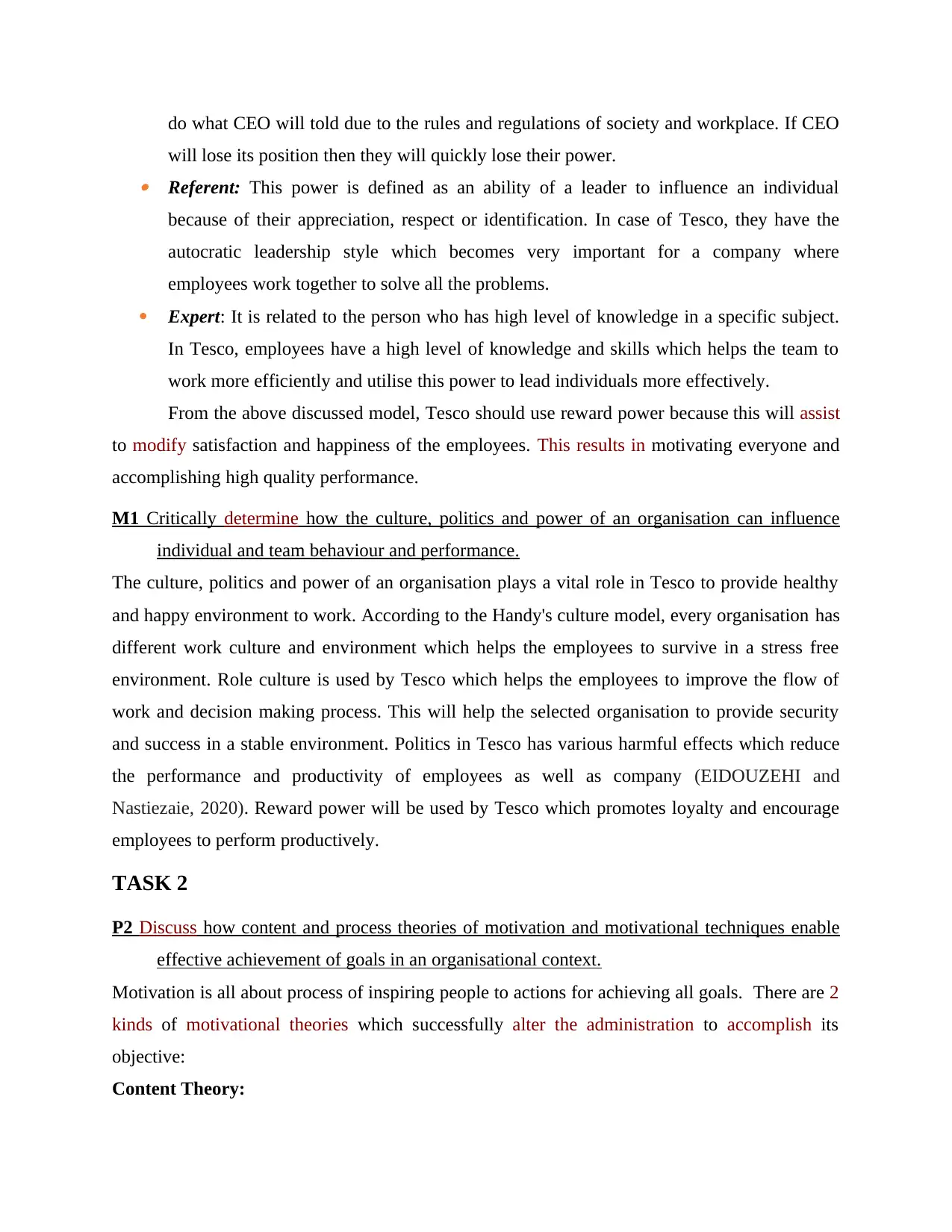
do what CEO will told due to the rules and regulations of society and workplace. If CEO
will lose its position then they will quickly lose their power. Referent: This power is defined as an ability of a leader to influence an individual
because of their appreciation, respect or identification. In case of Tesco, they have the
autocratic leadership style which becomes very important for a company where
employees work together to solve all the problems.
Expert: It is related to the person who has high level of knowledge in a specific subject.
In Tesco, employees have a high level of knowledge and skills which helps the team to
work more efficiently and utilise this power to lead individuals more effectively.
From the above discussed model, Tesco should use reward power because this will assist
to modify satisfaction and happiness of the employees. This results in motivating everyone and
accomplishing high quality performance.
M1 Critically determine how the culture, politics and power of an organisation can influence
individual and team behaviour and performance.
The culture, politics and power of an organisation plays a vital role in Tesco to provide healthy
and happy environment to work. According to the Handy's culture model, every organisation has
different work culture and environment which helps the employees to survive in a stress free
environment. Role culture is used by Tesco which helps the employees to improve the flow of
work and decision making process. This will help the selected organisation to provide security
and success in a stable environment. Politics in Tesco has various harmful effects which reduce
the performance and productivity of employees as well as company (EIDOUZEHI and
Nastiezaie, 2020). Reward power will be used by Tesco which promotes loyalty and encourage
employees to perform productively.
TASK 2
P2 Discuss how content and process theories of motivation and motivational techniques enable
effective achievement of goals in an organisational context.
Motivation is all about process of inspiring people to actions for achieving all goals. There are 2
kinds of motivational theories which successfully alter the administration to accomplish its
objective:
Content Theory:
will lose its position then they will quickly lose their power. Referent: This power is defined as an ability of a leader to influence an individual
because of their appreciation, respect or identification. In case of Tesco, they have the
autocratic leadership style which becomes very important for a company where
employees work together to solve all the problems.
Expert: It is related to the person who has high level of knowledge in a specific subject.
In Tesco, employees have a high level of knowledge and skills which helps the team to
work more efficiently and utilise this power to lead individuals more effectively.
From the above discussed model, Tesco should use reward power because this will assist
to modify satisfaction and happiness of the employees. This results in motivating everyone and
accomplishing high quality performance.
M1 Critically determine how the culture, politics and power of an organisation can influence
individual and team behaviour and performance.
The culture, politics and power of an organisation plays a vital role in Tesco to provide healthy
and happy environment to work. According to the Handy's culture model, every organisation has
different work culture and environment which helps the employees to survive in a stress free
environment. Role culture is used by Tesco which helps the employees to improve the flow of
work and decision making process. This will help the selected organisation to provide security
and success in a stable environment. Politics in Tesco has various harmful effects which reduce
the performance and productivity of employees as well as company (EIDOUZEHI and
Nastiezaie, 2020). Reward power will be used by Tesco which promotes loyalty and encourage
employees to perform productively.
TASK 2
P2 Discuss how content and process theories of motivation and motivational techniques enable
effective achievement of goals in an organisational context.
Motivation is all about process of inspiring people to actions for achieving all goals. There are 2
kinds of motivational theories which successfully alter the administration to accomplish its
objective:
Content Theory:
⊘ This is a preview!⊘
Do you want full access?
Subscribe today to unlock all pages.

Trusted by 1+ million students worldwide
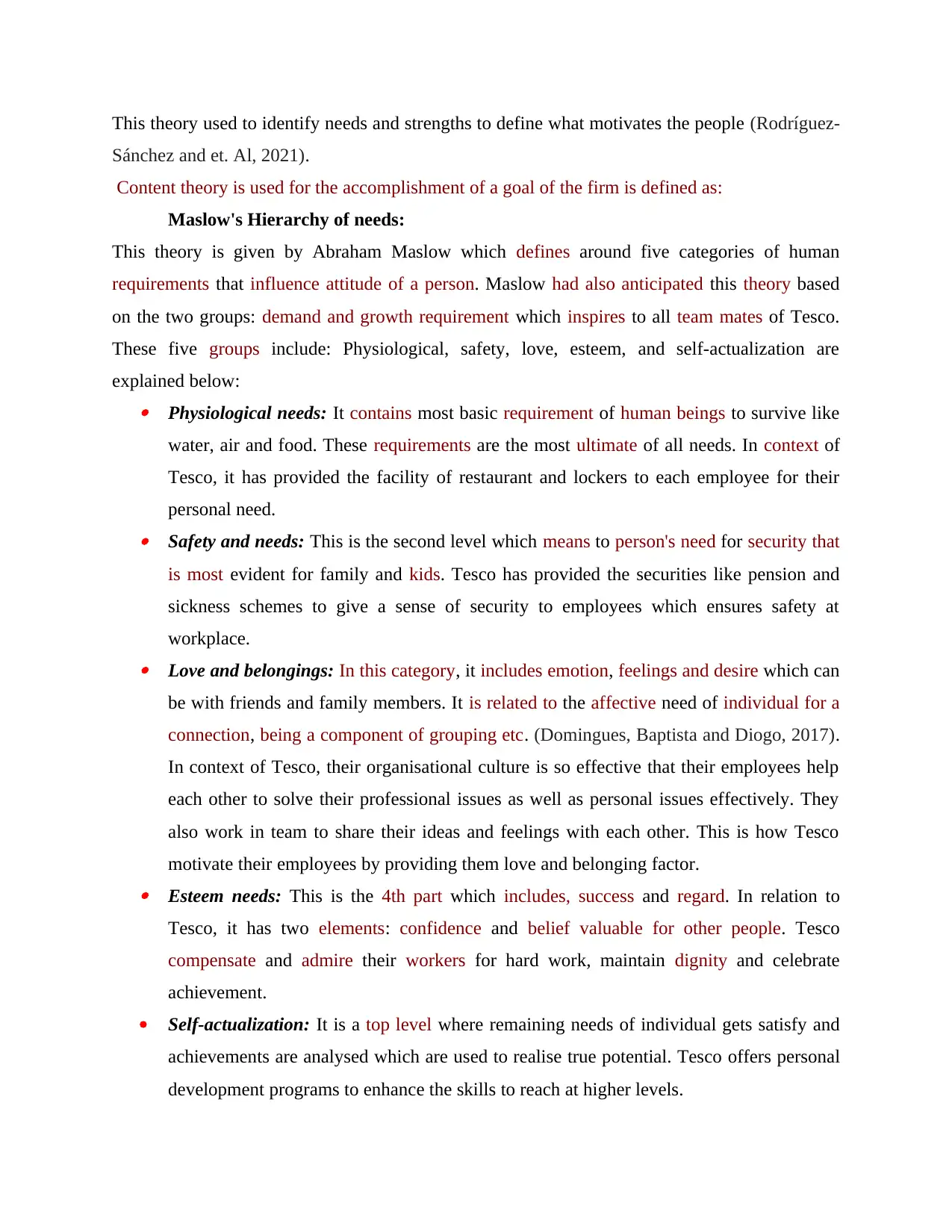
This theory used to identify needs and strengths to define what motivates the people (Rodríguez-
Sánchez and et. Al, 2021).
Content theory is used for the accomplishment of a goal of the firm is defined as:
Maslow's Hierarchy of needs:
This theory is given by Abraham Maslow which defines around five categories of human
requirements that influence attitude of a person. Maslow had also anticipated this theory based
on the two groups: demand and growth requirement which inspires to all team mates of Tesco.
These five groups include: Physiological, safety, love, esteem, and self-actualization are
explained below: Physiological needs: It contains most basic requirement of human beings to survive like
water, air and food. These requirements are the most ultimate of all needs. In context of
Tesco, it has provided the facility of restaurant and lockers to each employee for their
personal need. Safety and needs: This is the second level which means to person's need for security that
is most evident for family and kids. Tesco has provided the securities like pension and
sickness schemes to give a sense of security to employees which ensures safety at
workplace. Love and belongings: In this category, it includes emotion, feelings and desire which can
be with friends and family members. It is related to the affective need of individual for a
connection, being a component of grouping etc. (Domingues, Baptista and Diogo, 2017).
In context of Tesco, their organisational culture is so effective that their employees help
each other to solve their professional issues as well as personal issues effectively. They
also work in team to share their ideas and feelings with each other. This is how Tesco
motivate their employees by providing them love and belonging factor. Esteem needs: This is the 4th part which includes, success and regard. In relation to
Tesco, it has two elements: confidence and belief valuable for other people. Tesco
compensate and admire their workers for hard work, maintain dignity and celebrate
achievement.
Self-actualization: It is a top level where remaining needs of individual gets satisfy and
achievements are analysed which are used to realise true potential. Tesco offers personal
development programs to enhance the skills to reach at higher levels.
Sánchez and et. Al, 2021).
Content theory is used for the accomplishment of a goal of the firm is defined as:
Maslow's Hierarchy of needs:
This theory is given by Abraham Maslow which defines around five categories of human
requirements that influence attitude of a person. Maslow had also anticipated this theory based
on the two groups: demand and growth requirement which inspires to all team mates of Tesco.
These five groups include: Physiological, safety, love, esteem, and self-actualization are
explained below: Physiological needs: It contains most basic requirement of human beings to survive like
water, air and food. These requirements are the most ultimate of all needs. In context of
Tesco, it has provided the facility of restaurant and lockers to each employee for their
personal need. Safety and needs: This is the second level which means to person's need for security that
is most evident for family and kids. Tesco has provided the securities like pension and
sickness schemes to give a sense of security to employees which ensures safety at
workplace. Love and belongings: In this category, it includes emotion, feelings and desire which can
be with friends and family members. It is related to the affective need of individual for a
connection, being a component of grouping etc. (Domingues, Baptista and Diogo, 2017).
In context of Tesco, their organisational culture is so effective that their employees help
each other to solve their professional issues as well as personal issues effectively. They
also work in team to share their ideas and feelings with each other. This is how Tesco
motivate their employees by providing them love and belonging factor. Esteem needs: This is the 4th part which includes, success and regard. In relation to
Tesco, it has two elements: confidence and belief valuable for other people. Tesco
compensate and admire their workers for hard work, maintain dignity and celebrate
achievement.
Self-actualization: It is a top level where remaining needs of individual gets satisfy and
achievements are analysed which are used to realise true potential. Tesco offers personal
development programs to enhance the skills to reach at higher levels.
Paraphrase This Document
Need a fresh take? Get an instant paraphrase of this document with our AI Paraphraser
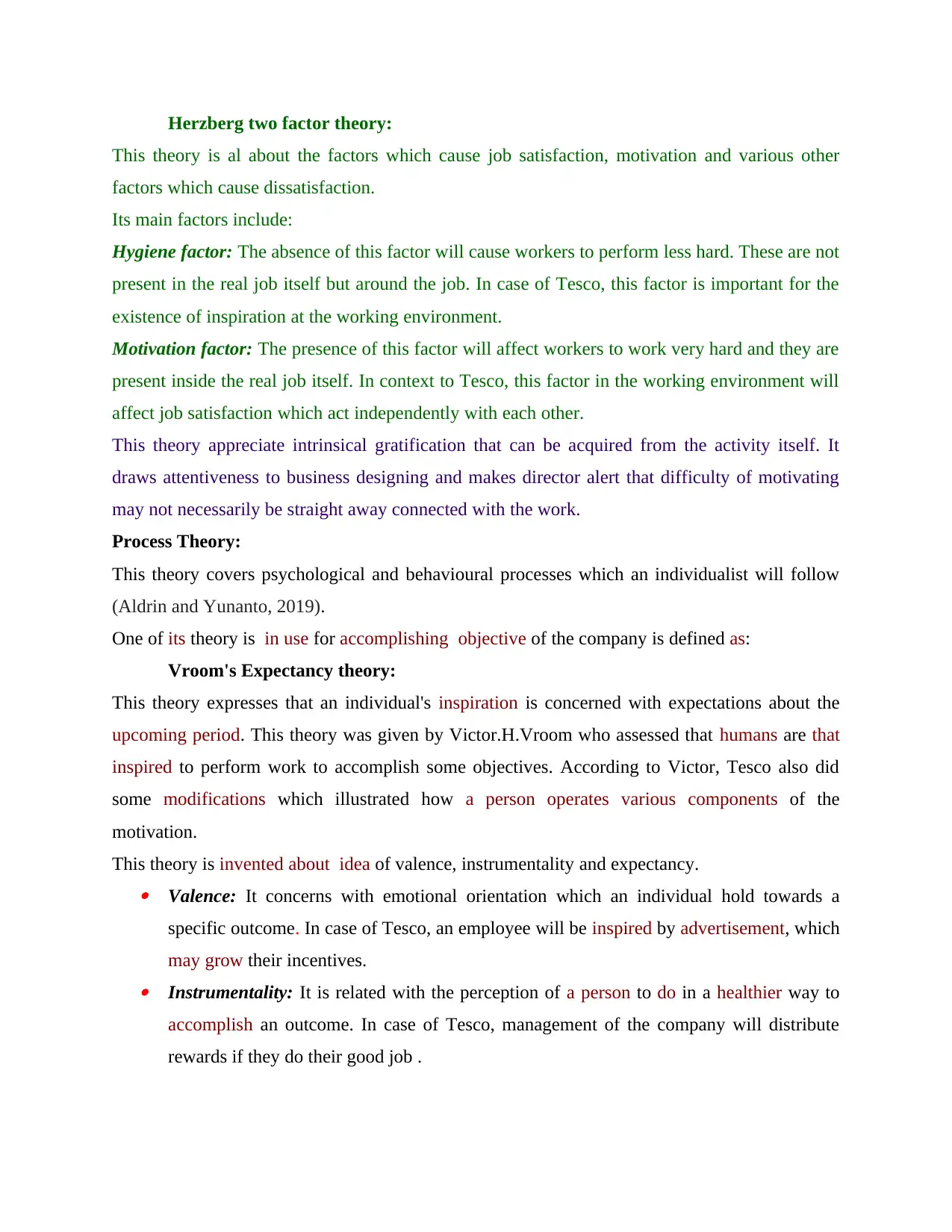
Herzberg two factor theory:
This theory is al about the factors which cause job satisfaction, motivation and various other
factors which cause dissatisfaction.
Its main factors include:
Hygiene factor: The absence of this factor will cause workers to perform less hard. These are not
present in the real job itself but around the job. In case of Tesco, this factor is important for the
existence of inspiration at the working environment.
Motivation factor: The presence of this factor will affect workers to work very hard and they are
present inside the real job itself. In context to Tesco, this factor in the working environment will
affect job satisfaction which act independently with each other.
This theory appreciate intrinsical gratification that can be acquired from the activity itself. It
draws attentiveness to business designing and makes director alert that difficulty of motivating
may not necessarily be straight away connected with the work.
Process Theory:
This theory covers psychological and behavioural processes which an individualist will follow
(Aldrin and Yunanto, 2019).
One of its theory is in use for accomplishing objective of the company is defined as:
Vroom's Expectancy theory:
This theory expresses that an individual's inspiration is concerned with expectations about the
upcoming period. This theory was given by Victor.H.Vroom who assessed that humans are that
inspired to perform work to accomplish some objectives. According to Victor, Tesco also did
some modifications which illustrated how a person operates various components of the
motivation.
This theory is invented about idea of valence, instrumentality and expectancy. Valence: It concerns with emotional orientation which an individual hold towards a
specific outcome. In case of Tesco, an employee will be inspired by advertisement, which
may grow their incentives. Instrumentality: It is related with the perception of a person to do in a healthier way to
accomplish an outcome. In case of Tesco, management of the company will distribute
rewards if they do their good job .
This theory is al about the factors which cause job satisfaction, motivation and various other
factors which cause dissatisfaction.
Its main factors include:
Hygiene factor: The absence of this factor will cause workers to perform less hard. These are not
present in the real job itself but around the job. In case of Tesco, this factor is important for the
existence of inspiration at the working environment.
Motivation factor: The presence of this factor will affect workers to work very hard and they are
present inside the real job itself. In context to Tesco, this factor in the working environment will
affect job satisfaction which act independently with each other.
This theory appreciate intrinsical gratification that can be acquired from the activity itself. It
draws attentiveness to business designing and makes director alert that difficulty of motivating
may not necessarily be straight away connected with the work.
Process Theory:
This theory covers psychological and behavioural processes which an individualist will follow
(Aldrin and Yunanto, 2019).
One of its theory is in use for accomplishing objective of the company is defined as:
Vroom's Expectancy theory:
This theory expresses that an individual's inspiration is concerned with expectations about the
upcoming period. This theory was given by Victor.H.Vroom who assessed that humans are that
inspired to perform work to accomplish some objectives. According to Victor, Tesco also did
some modifications which illustrated how a person operates various components of the
motivation.
This theory is invented about idea of valence, instrumentality and expectancy. Valence: It concerns with emotional orientation which an individual hold towards a
specific outcome. In case of Tesco, an employee will be inspired by advertisement, which
may grow their incentives. Instrumentality: It is related with the perception of a person to do in a healthier way to
accomplish an outcome. In case of Tesco, management of the company will distribute
rewards if they do their good job .
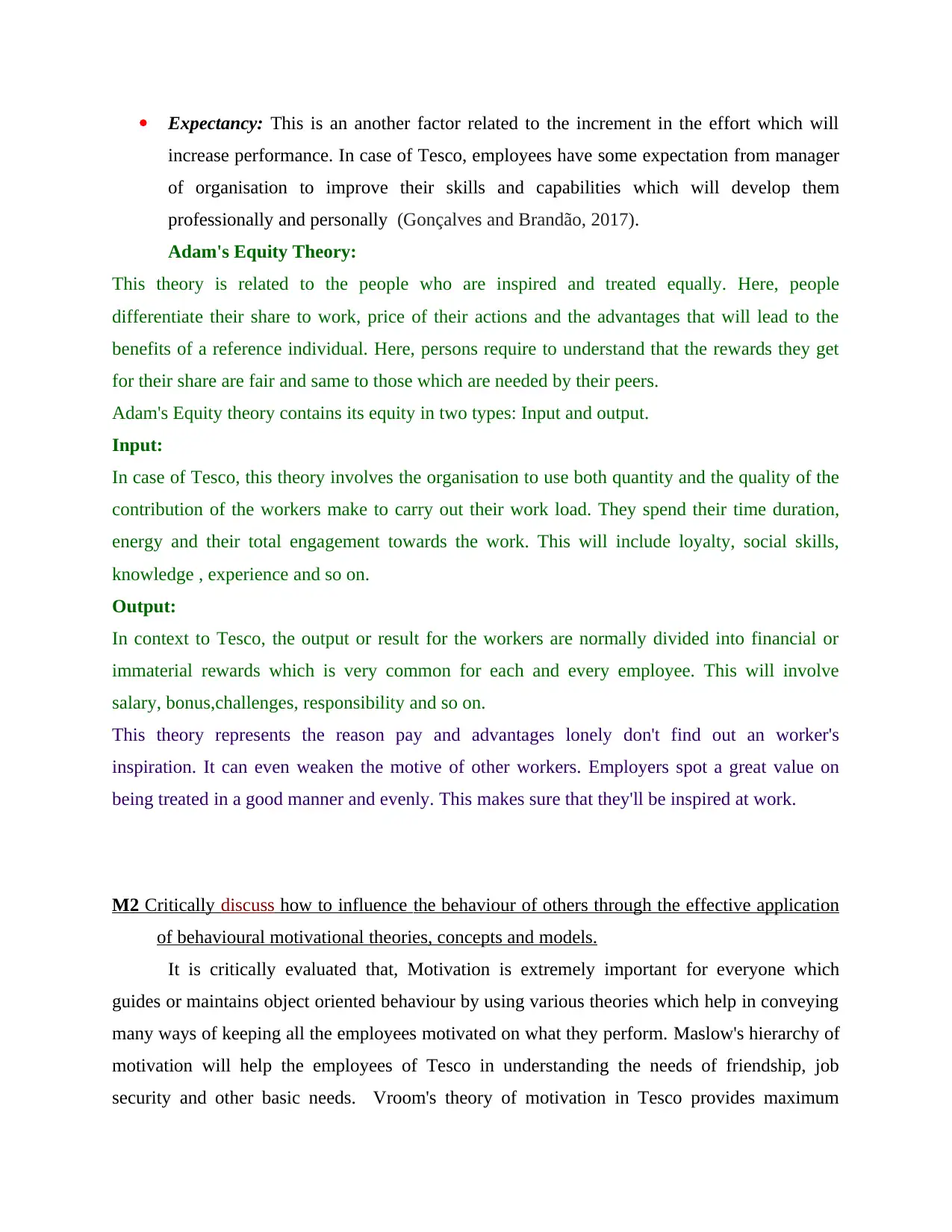
Expectancy: This is an another factor related to the increment in the effort which will
increase performance. In case of Tesco, employees have some expectation from manager
of organisation to improve their skills and capabilities which will develop them
professionally and personally (Gonçalves and Brandão, 2017).
Adam's Equity Theory:
This theory is related to the people who are inspired and treated equally. Here, people
differentiate their share to work, price of their actions and the advantages that will lead to the
benefits of a reference individual. Here, persons require to understand that the rewards they get
for their share are fair and same to those which are needed by their peers.
Adam's Equity theory contains its equity in two types: Input and output.
Input:
In case of Tesco, this theory involves the organisation to use both quantity and the quality of the
contribution of the workers make to carry out their work load. They spend their time duration,
energy and their total engagement towards the work. This will include loyalty, social skills,
knowledge , experience and so on.
Output:
In context to Tesco, the output or result for the workers are normally divided into financial or
immaterial rewards which is very common for each and every employee. This will involve
salary, bonus,challenges, responsibility and so on.
This theory represents the reason pay and advantages lonely don't find out an worker's
inspiration. It can even weaken the motive of other workers. Employers spot a great value on
being treated in a good manner and evenly. This makes sure that they'll be inspired at work.
M2 Critically discuss how to influence the behaviour of others through the effective application
of behavioural motivational theories, concepts and models.
It is critically evaluated that, Motivation is extremely important for everyone which
guides or maintains object oriented behaviour by using various theories which help in conveying
many ways of keeping all the employees motivated on what they perform. Maslow's hierarchy of
motivation will help the employees of Tesco in understanding the needs of friendship, job
security and other basic needs. Vroom's theory of motivation in Tesco provides maximum
increase performance. In case of Tesco, employees have some expectation from manager
of organisation to improve their skills and capabilities which will develop them
professionally and personally (Gonçalves and Brandão, 2017).
Adam's Equity Theory:
This theory is related to the people who are inspired and treated equally. Here, people
differentiate their share to work, price of their actions and the advantages that will lead to the
benefits of a reference individual. Here, persons require to understand that the rewards they get
for their share are fair and same to those which are needed by their peers.
Adam's Equity theory contains its equity in two types: Input and output.
Input:
In case of Tesco, this theory involves the organisation to use both quantity and the quality of the
contribution of the workers make to carry out their work load. They spend their time duration,
energy and their total engagement towards the work. This will include loyalty, social skills,
knowledge , experience and so on.
Output:
In context to Tesco, the output or result for the workers are normally divided into financial or
immaterial rewards which is very common for each and every employee. This will involve
salary, bonus,challenges, responsibility and so on.
This theory represents the reason pay and advantages lonely don't find out an worker's
inspiration. It can even weaken the motive of other workers. Employers spot a great value on
being treated in a good manner and evenly. This makes sure that they'll be inspired at work.
M2 Critically discuss how to influence the behaviour of others through the effective application
of behavioural motivational theories, concepts and models.
It is critically evaluated that, Motivation is extremely important for everyone which
guides or maintains object oriented behaviour by using various theories which help in conveying
many ways of keeping all the employees motivated on what they perform. Maslow's hierarchy of
motivation will help the employees of Tesco in understanding the needs of friendship, job
security and other basic needs. Vroom's theory of motivation in Tesco provides maximum
⊘ This is a preview!⊘
Do you want full access?
Subscribe today to unlock all pages.

Trusted by 1+ million students worldwide
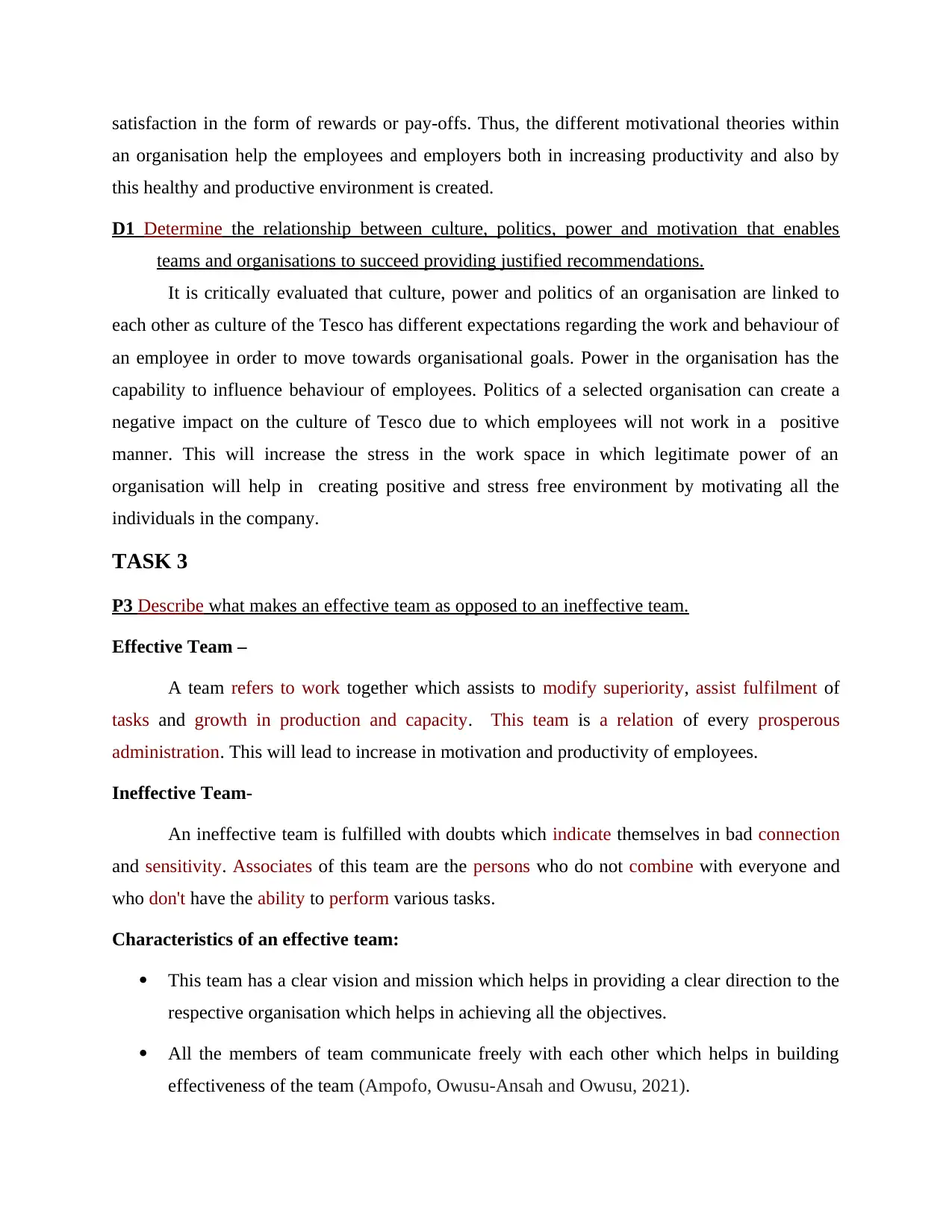
satisfaction in the form of rewards or pay-offs. Thus, the different motivational theories within
an organisation help the employees and employers both in increasing productivity and also by
this healthy and productive environment is created.
D1 Determine the relationship between culture, politics, power and motivation that enables
teams and organisations to succeed providing justified recommendations.
It is critically evaluated that culture, power and politics of an organisation are linked to
each other as culture of the Tesco has different expectations regarding the work and behaviour of
an employee in order to move towards organisational goals. Power in the organisation has the
capability to influence behaviour of employees. Politics of a selected organisation can create a
negative impact on the culture of Tesco due to which employees will not work in a positive
manner. This will increase the stress in the work space in which legitimate power of an
organisation will help in creating positive and stress free environment by motivating all the
individuals in the company.
TASK 3
P3 Describe what makes an effective team as opposed to an ineffective team.
Effective Team –
A team refers to work together which assists to modify superiority, assist fulfilment of
tasks and growth in production and capacity. This team is a relation of every prosperous
administration. This will lead to increase in motivation and productivity of employees.
Ineffective Team-
An ineffective team is fulfilled with doubts which indicate themselves in bad connection
and sensitivity. Associates of this team are the persons who do not combine with everyone and
who don't have the ability to perform various tasks.
Characteristics of an effective team:
This team has a clear vision and mission which helps in providing a clear direction to the
respective organisation which helps in achieving all the objectives.
All the members of team communicate freely with each other which helps in building
effectiveness of the team (Ampofo, Owusu-Ansah and Owusu, 2021).
an organisation help the employees and employers both in increasing productivity and also by
this healthy and productive environment is created.
D1 Determine the relationship between culture, politics, power and motivation that enables
teams and organisations to succeed providing justified recommendations.
It is critically evaluated that culture, power and politics of an organisation are linked to
each other as culture of the Tesco has different expectations regarding the work and behaviour of
an employee in order to move towards organisational goals. Power in the organisation has the
capability to influence behaviour of employees. Politics of a selected organisation can create a
negative impact on the culture of Tesco due to which employees will not work in a positive
manner. This will increase the stress in the work space in which legitimate power of an
organisation will help in creating positive and stress free environment by motivating all the
individuals in the company.
TASK 3
P3 Describe what makes an effective team as opposed to an ineffective team.
Effective Team –
A team refers to work together which assists to modify superiority, assist fulfilment of
tasks and growth in production and capacity. This team is a relation of every prosperous
administration. This will lead to increase in motivation and productivity of employees.
Ineffective Team-
An ineffective team is fulfilled with doubts which indicate themselves in bad connection
and sensitivity. Associates of this team are the persons who do not combine with everyone and
who don't have the ability to perform various tasks.
Characteristics of an effective team:
This team has a clear vision and mission which helps in providing a clear direction to the
respective organisation which helps in achieving all the objectives.
All the members of team communicate freely with each other which helps in building
effectiveness of the team (Ampofo, Owusu-Ansah and Owusu, 2021).
Paraphrase This Document
Need a fresh take? Get an instant paraphrase of this document with our AI Paraphraser
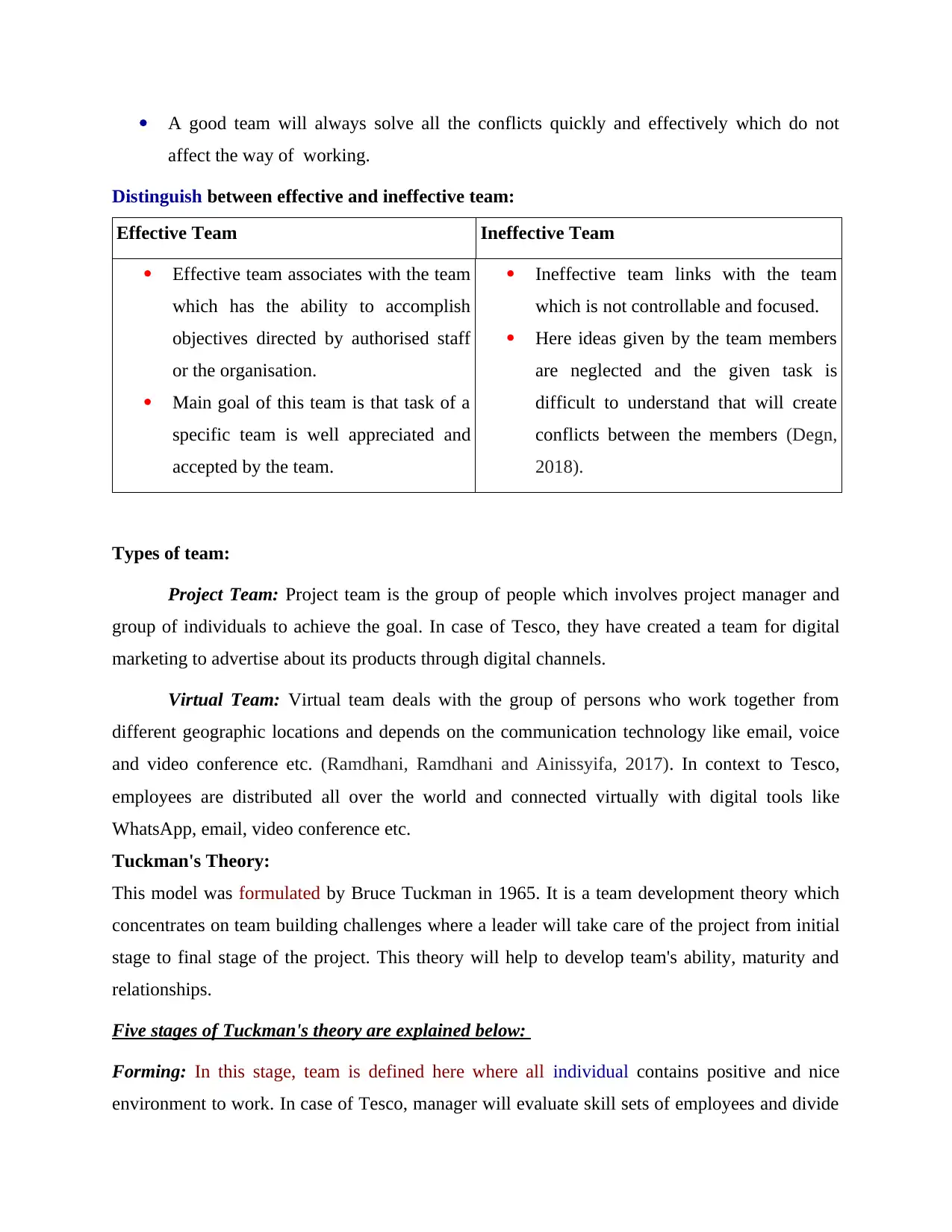
A good team will always solve all the conflicts quickly and effectively which do not
affect the way of working.
Distinguish between effective and ineffective team:
Effective Team Ineffective Team
Effective team associates with the team
which has the ability to accomplish
objectives directed by authorised staff
or the organisation.
Main goal of this team is that task of a
specific team is well appreciated and
accepted by the team.
Ineffective team links with the team
which is not controllable and focused.
Here ideas given by the team members
are neglected and the given task is
difficult to understand that will create
conflicts between the members (Degn,
2018).
Types of team:
Project Team: Project team is the group of people which involves project manager and
group of individuals to achieve the goal. In case of Tesco, they have created a team for digital
marketing to advertise about its products through digital channels.
Virtual Team: Virtual team deals with the group of persons who work together from
different geographic locations and depends on the communication technology like email, voice
and video conference etc. (Ramdhani, Ramdhani and Ainissyifa, 2017). In context to Tesco,
employees are distributed all over the world and connected virtually with digital tools like
WhatsApp, email, video conference etc.
Tuckman's Theory:
This model was formulated by Bruce Tuckman in 1965. It is a team development theory which
concentrates on team building challenges where a leader will take care of the project from initial
stage to final stage of the project. This theory will help to develop team's ability, maturity and
relationships.
Five stages of Tuckman's theory are explained below:
Forming: In this stage, team is defined here where all individual contains positive and nice
environment to work. In case of Tesco, manager will evaluate skill sets of employees and divide
affect the way of working.
Distinguish between effective and ineffective team:
Effective Team Ineffective Team
Effective team associates with the team
which has the ability to accomplish
objectives directed by authorised staff
or the organisation.
Main goal of this team is that task of a
specific team is well appreciated and
accepted by the team.
Ineffective team links with the team
which is not controllable and focused.
Here ideas given by the team members
are neglected and the given task is
difficult to understand that will create
conflicts between the members (Degn,
2018).
Types of team:
Project Team: Project team is the group of people which involves project manager and
group of individuals to achieve the goal. In case of Tesco, they have created a team for digital
marketing to advertise about its products through digital channels.
Virtual Team: Virtual team deals with the group of persons who work together from
different geographic locations and depends on the communication technology like email, voice
and video conference etc. (Ramdhani, Ramdhani and Ainissyifa, 2017). In context to Tesco,
employees are distributed all over the world and connected virtually with digital tools like
WhatsApp, email, video conference etc.
Tuckman's Theory:
This model was formulated by Bruce Tuckman in 1965. It is a team development theory which
concentrates on team building challenges where a leader will take care of the project from initial
stage to final stage of the project. This theory will help to develop team's ability, maturity and
relationships.
Five stages of Tuckman's theory are explained below:
Forming: In this stage, team is defined here where all individual contains positive and nice
environment to work. In case of Tesco, manager will evaluate skill sets of employees and divide
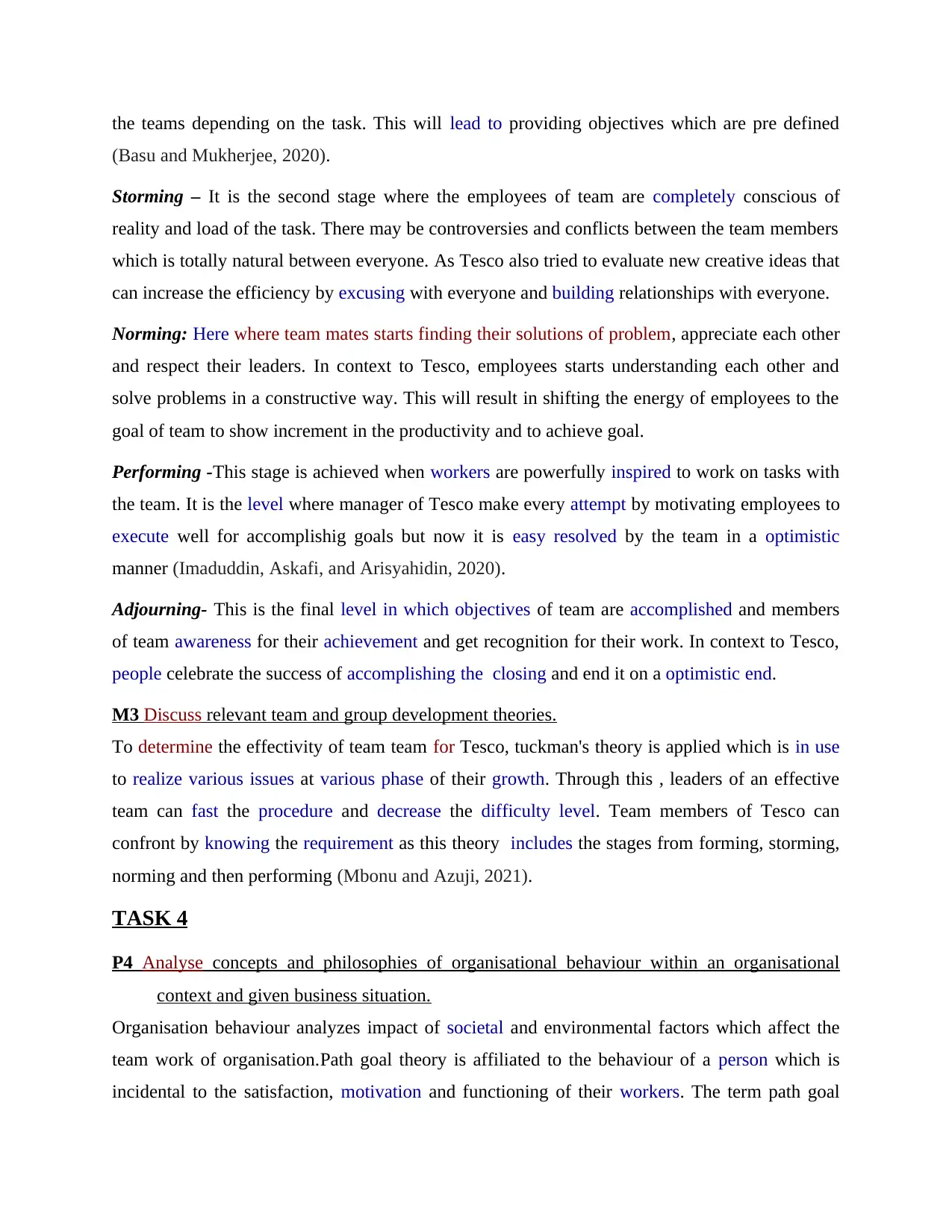
the teams depending on the task. This will lead to providing objectives which are pre defined
(Basu and Mukherjee, 2020).
Storming – It is the second stage where the employees of team are completely conscious of
reality and load of the task. There may be controversies and conflicts between the team members
which is totally natural between everyone. As Tesco also tried to evaluate new creative ideas that
can increase the efficiency by excusing with everyone and building relationships with everyone.
Norming: Here where team mates starts finding their solutions of problem, appreciate each other
and respect their leaders. In context to Tesco, employees starts understanding each other and
solve problems in a constructive way. This will result in shifting the energy of employees to the
goal of team to show increment in the productivity and to achieve goal.
Performing -This stage is achieved when workers are powerfully inspired to work on tasks with
the team. It is the level where manager of Tesco make every attempt by motivating employees to
execute well for accomplishig goals but now it is easy resolved by the team in a optimistic
manner (Imaduddin, Askafi, and Arisyahidin, 2020).
Adjourning- This is the final level in which objectives of team are accomplished and members
of team awareness for their achievement and get recognition for their work. In context to Tesco,
people celebrate the success of accomplishing the closing and end it on a optimistic end.
M3 Discuss relevant team and group development theories.
To determine the effectivity of team team for Tesco, tuckman's theory is applied which is in use
to realize various issues at various phase of their growth. Through this , leaders of an effective
team can fast the procedure and decrease the difficulty level. Team members of Tesco can
confront by knowing the requirement as this theory includes the stages from forming, storming,
norming and then performing (Mbonu and Azuji, 2021).
TASK 4
P4 Analyse concepts and philosophies of organisational behaviour within an organisational
context and given business situation.
Organisation behaviour analyzes impact of societal and environmental factors which affect the
team work of organisation.Path goal theory is affiliated to the behaviour of a person which is
incidental to the satisfaction, motivation and functioning of their workers. The term path goal
(Basu and Mukherjee, 2020).
Storming – It is the second stage where the employees of team are completely conscious of
reality and load of the task. There may be controversies and conflicts between the team members
which is totally natural between everyone. As Tesco also tried to evaluate new creative ideas that
can increase the efficiency by excusing with everyone and building relationships with everyone.
Norming: Here where team mates starts finding their solutions of problem, appreciate each other
and respect their leaders. In context to Tesco, employees starts understanding each other and
solve problems in a constructive way. This will result in shifting the energy of employees to the
goal of team to show increment in the productivity and to achieve goal.
Performing -This stage is achieved when workers are powerfully inspired to work on tasks with
the team. It is the level where manager of Tesco make every attempt by motivating employees to
execute well for accomplishig goals but now it is easy resolved by the team in a optimistic
manner (Imaduddin, Askafi, and Arisyahidin, 2020).
Adjourning- This is the final level in which objectives of team are accomplished and members
of team awareness for their achievement and get recognition for their work. In context to Tesco,
people celebrate the success of accomplishing the closing and end it on a optimistic end.
M3 Discuss relevant team and group development theories.
To determine the effectivity of team team for Tesco, tuckman's theory is applied which is in use
to realize various issues at various phase of their growth. Through this , leaders of an effective
team can fast the procedure and decrease the difficulty level. Team members of Tesco can
confront by knowing the requirement as this theory includes the stages from forming, storming,
norming and then performing (Mbonu and Azuji, 2021).
TASK 4
P4 Analyse concepts and philosophies of organisational behaviour within an organisational
context and given business situation.
Organisation behaviour analyzes impact of societal and environmental factors which affect the
team work of organisation.Path goal theory is affiliated to the behaviour of a person which is
incidental to the satisfaction, motivation and functioning of their workers. The term path goal
⊘ This is a preview!⊘
Do you want full access?
Subscribe today to unlock all pages.

Trusted by 1+ million students worldwide
1 out of 17
Related Documents
Your All-in-One AI-Powered Toolkit for Academic Success.
+13062052269
info@desklib.com
Available 24*7 on WhatsApp / Email
![[object Object]](/_next/static/media/star-bottom.7253800d.svg)
Unlock your academic potential
Copyright © 2020–2026 A2Z Services. All Rights Reserved. Developed and managed by ZUCOL.




